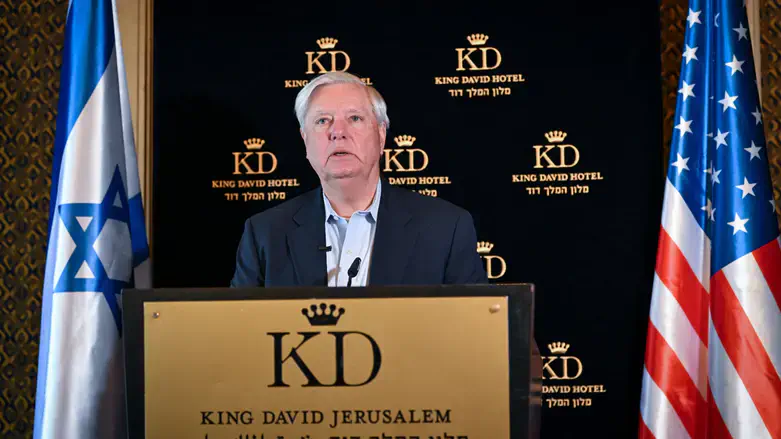
US President-elect Donald Trump is keen on achieving a ceasefire and hostage agreement in Gaza before his inauguration on January 20, according to Senator Lindsey Graham (R-SC), who spoke to Axios in an interview.
Securing a deal in Gaza is a key priority for President Biden as he approaches the end of his term, but the lack of tangible progress in recent weeks suggests the task may fall to Trump.
Israeli officials speculate that the incoming Trump administration could take a different stance on Gaza, particularly concerning what happens in the aftermath of the war.
Graham, a close confidant and foreign policy adviser to Trump, emphasized that the President-elect is focused on resolving the hostage crisis and ending the conflict quickly, ideally before his term begins.
"Trump is more determined than ever to release the hostages and supports a ceasefire that includes a hostage deal. He wants to see it happening now," Graham told Axios.
"I want people in Israel and in the region to know that Trump is focused on the hostages issue. He wants the killing to stop and the fighting to end," he added.
Graham also expressed hope for cooperation between the Biden administration and Trump during the transition period, saying, "I hope President Trump and the Biden administration will work together during the transition period to release the hostages and get a ceasefire."
His comments came following his return from a Middle East trip—his second this month—where he met with Saudi Crown Prince Mohammed Bin Salman and Prime Minister Benjamin Netanyahu.
Graham argued that resolving the Gaza conflict is crucial for Trump to concentrate on broader regional goals, including normalizing relations between Israel and Saudi Arabia and building a regional coalition to counter Iran.
"Diplomacy in the region will be easier because of Trump's win, as people are afraid of him," Graham told Axios. "If you are a bad guy and you are not afraid of Trump, then you are also a dumb guy. Bad and dumb guys don't last long."
Currently, 101 hostages remain in Gaza under Hamas' control, including seven American citizens. Israeli intelligence estimates that around half are still alive.
Karoline Leavitt, a spokesperson for Trump’s transition team, told Axios that Trump was reelected because "the American people trust him to lead our country and bring stability and peace back to the Middle East."
"When he returns to the White House, he will take the necessary action to do just that," Leavitt said.
On Wednesday, Axios reported that US President Joe Biden emphasized to Netanyahu during a phone call on Tuesday that, following the ceasefire agreement in Lebanon, the priority should now shift to securing the release of hostages and achieving a ceasefire in Gaza.
The phone call between Biden and Netanyahu, which occurred shortly after Israel’s Security Cabinet approved the Lebanon ceasefire, was brief, according to Axios. Aside from Lebanon, the conversation focused solely on efforts to secure a hostage deal and establish a ceasefire in Gaza.
“We have an opportunity now. Let’s get the hostages,” Biden reportedly told Netanyahu. US officials said Netanyahu responded positively, expressing a willingness to pursue the effort.
The Prime Minister's Office declined to comment on the report.
The Hamas terrorist organization put out an official statement earlier on Wednesday, saying that it is interested in a deal to end the war which began after it launched an attack on Israel on October 7, 2023.
However, in that statement, Hamas again insisted that any agreement must include an end to the war and a full withdrawal of Israeli forces from Gaza.
Israel and Hamas have held several rounds of indirect negotiations, with the US, Egypt and Qatar serving as mediators, in an attempt to reach a ceasefire in Gaza and for Hamas to free the hostages it has been holding since the October 7, 2023 massacre.
The United States had been pushing an outline for a ceasefire and hostage release deal that President Joe Biden first laid out in May, but Hamas rejected that proposal and every other proposal that has been presented to it.
Recently, Egypt publicly proposed a two-day ceasefire deal in which four Israeli hostages would be released in exchange for terrorist prisoners held in Israel and in the ten days following, negotiations would be held regarding a more extensive deal.
Hamas initially said it does not support a limited timeframe of several days in which the organization would return some of the hostages and afterwards the fighting would continue. Later, sources in Hamas told the Asharq Al-Awsat newspaper that the terrorist organization is willing to consider Egypt’s proposal as well as other proposals.